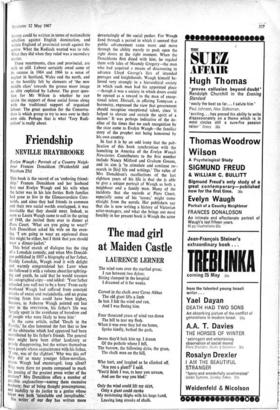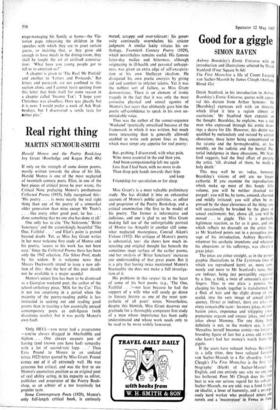Friendship
NEVILLE BRAYBROOKE
This book is the record of an 'enduring friend- ship.' Frances Donaldson and her husband first met Evelyn Waugh and his wife when the latter was in his late forties. Both families had gone to live in the Gloucestershire Cots- wolds, and since they had friends in common and their two social worlds overlapped, it was inevitable that they should meet. Indeed, as soon as Laura Waugh came to call in the spring of 1948, she invited them over to dinner at Piers Court. 'What are you going, to wear?' Jack Donaldson asked his wife on the even- ing. 'I am going to wear an equivocal dress that might be either, but I think that you should wear a dinner-jacket.'
This brief snatch of dialogue has the ring of a Lonsdale comedy, and when Mrs Donald- son published in 1957 a biography of her father, Freddy Lonsdale, Waugh read it with delight and warmly congratulated her. Later when she followed it with a volume about her upbring- ing and youth, he said that he would treasure his autographed copy—and added: 'Your father schooled you well not to be a bore.' From early manhood Waugh had suffered from constant attacks of ennui and melancholia, and no praise coming from him could have been higher, because, as Auberon Waugh pointed out last year in the SPECTATOR, his father's life was 'largely spent in the avoidance of boredom and of people who were likely to bore him.'
In the same article, called 'Death in the Family,' he also lamented the fact that so few of the obituaries which had appeared had been contributed by his father's friends. The general tone might have been either laudatory or primly disapproving, but the writers themselves :were people whose acquaintance with his father, if any, was of the slightest.' Why was this so? Why did so many younger fellow-novelists, whom Waugh had encouraged, keep silent? Why were there no poems composed to mark the passing of the greatest prose writer of the century? Mrs Donaldson offers a number of Possible explanations—among them excessive modesty; fear of being thought presumptuous; and inability to do justice to a genius whose talent was both 'inimitable and inexplicable.'
No writer of our day has written more devastatingly of the social pusher. For Waugh lived through a period in which it seemed that public advancement came more and more through the ability merely to push open the right doors at the right moment. When the Donaldsons first dined with him, he regaled them with tales of Maundy Gregory—the man who had acquired a means of discovering in advance Lloyd George's lists of intended peerages and knighthoods. Waugh himself be- lieved very strongly in a hierarchical society in which each man had his appointed place —though it was a society in which doors could be opened as a reward to the man of excep- tional talent. Disraeli, in offering Tennyson a baronetcy, expressed the view that government should recognise exceptional talent, since 'it helped to elevate and sustain the spirit of a nation.' It was perhaps indicative of the de- cline of the times that no such recognition by the state came to Evelyn Waugh—the familiar story of the prophet not being honoured by his own country.
In fact it is by an odd irony that the pub- lication of this book synchronises with the launching in America of the Evelyn Waugh Newsletter. Contributors to the first number include Nancy Mitford and Graham Greene, and its aim is `to stimulate and continue re-• search in [his] life and writings.' The value of Mrs Donaldson's recollections of the last eighteen years of his life is that she is able to give a unique portrait of Waugh as both a neighbour and a family man. Many of the incidents that she records at Piers Court, especially some of his 'teases,' might come straight from the novels. Her publishers say that she is now writing a history of Victorian actor-managers, and what she brings out most forcibly in her present book is Waugh the actor
stage-managing his family at home—the Vic- torian papa rehearsing the children in the speeches with which they are to greet certain guests, or insisting that, as they grow old enough to have meals in the dining-loom, they shall be taught the art of civilised conversa- tion: 'What have you young people got to tell us to entertain us?'
A chapter is given to 'The Real Mr Pinfold' and another to 'Letters and Postcards.' But letters and postcards are not confined to this section alone, and I cannot resist quoting from this letter that finds itself for some reason in a chapter called 'Income Tax': 'I hope your Christmas was cloudless. Ours was ghastly but it is over. I would prefer a week of Ash Wed- nesdays, but I discovered a senile taste for mince pies.'































 Previous page
Previous page